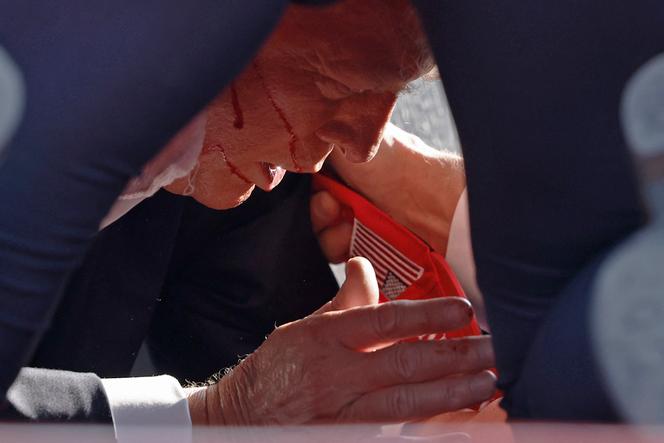


Former US president Donald Trump was rushed off a campaign stage in Pennsylvania on Saturday, July 13, after the 2024 presidential candidate was targeted in what the FBI is investigating as an assassination attempt.
Bullets grazed Trump, whose ear was injured, while one rally attendee was killed and two others were critically wounded. The FBI has named the suspected shooter, who was killed, as 20-year-old Thomas Matthew Crooks.
As Trump calls for Americans to "stand united" following the attack, Le Monde columnist and former Washington correspondent Gilles Paris answered questions from our readers on what effects Saturday's shooting in Pennsylvania could have on the looming presidential election, and on American democracy itself.
Before answering, let me remind you that we currently have no information on the motives of the presumed shooter, even if his action speaks for itself.
In the United States, former presidents are statutorily protected by the Secret Service, a federal agency that has been carrying out this mission for over a century. This protection, which also extends to a former president's spouse, lasts until their death. The same service is also responsible for protecting presidential candidates when they are assured of winning their party's nomination. So Donald Trump had two reasons to have them by his side in Pennsylvania.
The confluence of the huge amount of firearms in circulation and the growing acceptance of the legitimacy of political violence is indeed posing a threat to the US that very nearly materialized in Pennsylvania. A bystander was killed by the shots that were aimed at Donald Trump, according to US authorities.
In 2011, Arizona Representative Gabby Gifford was seriously wounded by a gunman who was sentenced to life imprisonment. In 2017, the number two in the Republican Party, Steve Scalise, was seriously wounded by a left-wing shooter hostile to the conservative camp during baseball training for congressional representatives at a charity event. The gunman was killed in an exchange of fire with police. In 2022, the husband of the then speaker of the House of Representatives Nancy Pelosi was brutally attacked in his home with a hammer. The reactions of many Republicans at the time were not that impressive.
The American presidential campaign was already out of the ordinary because it pitted the two oldest and least popular candidates of recent elections against each other. A clear majority of voters have consistently expressed their opposition to this replica of the 2020 election. What happened in Pennsylvania will obviously play into Donald Trump's hands, with the images of his raised determined fist before hastily leaving the stage where he had begun speaking set to leave a lasting impression.
The former president was already arriving at the Republican convention in Milwaukee, scheduled for this Monday in the key state of Wisconsin, in a strong position after his debate with Joe Biden on June 27, which was marked by the failings of the Democratic president, and after a decision by the Supreme Court that was very favorable to him, further delaying the trial during which he could answer for his role on January 6. As a result, he is entering the final stretch of the campaign in a stronger-than-ever position.
If the political consequences of the latest mass shootings are anything to go by, it's very, very unlikely that this dramatic event will change anything. The issue of firearms, like that of abortion, has become such a marker of the culture war between Democrats and Republicans that no compromise seems possible for a long time to come. Republican hostility to any regulation of gun ownership and the right to carry firearms has been reinforced by the latest decisions of a conservative-majority Supreme Court, notably the ban on the device that turns a semi-automatic weapon into a full-fledged weapon of war.
A possible candidate for vice president, Senator J.D. Vance of Ohio, has already blamed the Democrats' "rhetoric" for the shooting in Pennsylvania. Joe Biden's main campaign message is to highlight the danger he believes the reelection of Trump poses for the US and American democracy.
And with good reason: The former president has never stopped talking about his desire to settle scores with those he considers responsible for his defeat in 2020, which he never accepted. His entourage has concocted a massive purge of federal power. The FBI has also been called into question, notably for its role in the case of classified documents illegally retained by Trump after he left the White House. But it will be difficult for the Democratic camp to dramatize what is at stake in the November 5 election without being labeled a crime monger by the Republicans.
In May, a Reuters/Ipsos poll showed that 68% of respondents feared violence after the November 5 presidential election if the result was not accepted by the losing candidate's camp.
Before the attempted assassination in Pennsylvania, the Democratic camp was prey to unprecedented divisions over the retention of Biden. A change of candidate was being called for by a growing minority of elected representatives, with all the risks that such an operation, unprecedented in the recent history of American presidential elections, entails. The images of Trump in the seconds after the shots were fired at him can only reinforce the contrast with an outgoing president who gives off an image of great fragility.
But what happened on July 13 further complicates the Democrats' task. It's no longer just a question of Biden's state of health, but also of the language that can now be used against Trump, given his new status as the miracle survivor of political violence that had been associated since January 6 with far-right militias.
